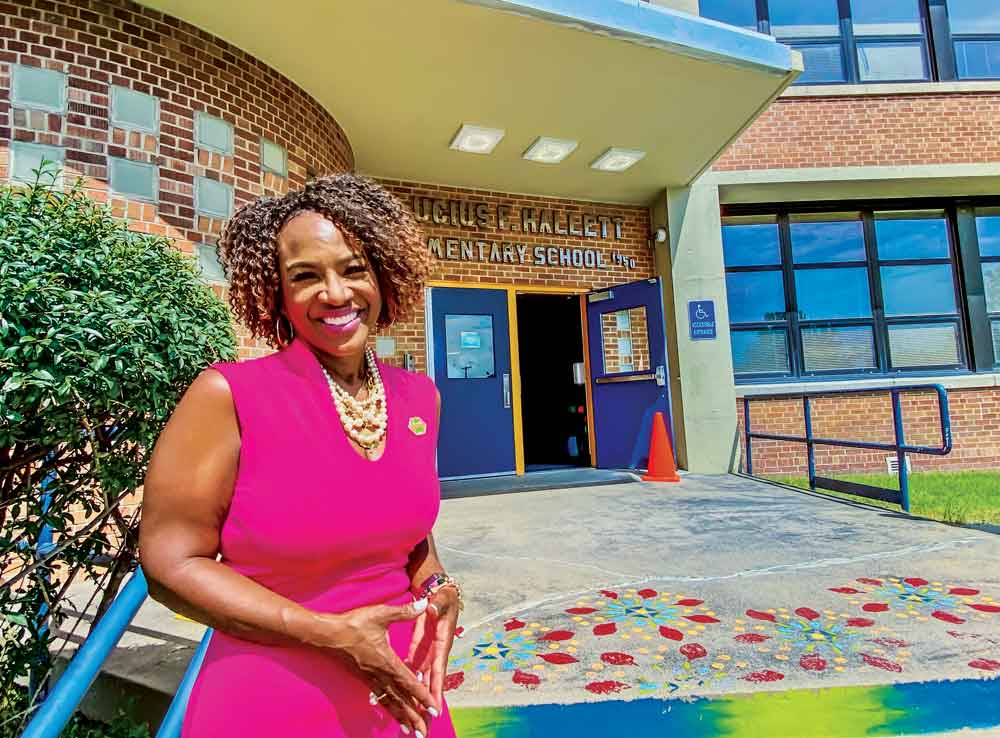
Sharon Hicks, president of the Denver chapter of the Alpha Kappa Alpha sorority, stands outside Hallet Elementary School in Park Hill. For several years, the Black sorority has provided groceries for families in need at the school. Front Porch photo by Steve Larson
Members of the nation’s oldest African American sorority, Alpha Kappa Alpha (AKA), were thrilled last November when one of their own, Kamala Harris, was elected as the nation’s first female Vice President of the United States. “We were all just in awe. It made us all want to do more and be our best selves. Everything she stands for is what we stand for,” said AKA Denver chapter president Sharon Hicks. She also noted that the attention Harris is bringing to the organization has boosted both membership and enthusiasm in the organization. “So many people are becoming even more active, realizing that we have greater things to accomplish.”
But being at the forefront of politics and social change is nothing new for this 113-year-old organization, which was founded at Howard University, a historically Black college located in Washington, D.C. From the very beginning, the sorority has been involved with expanding voting rights, transforming education, eradicating poverty, and expanding health care services for African Americans—including the establishment of the nation’s first mobile health clinic in 1935. The service organization has more than one thousand chapters around the world and nearly 300,000 members. This spring, a film called “Twenty Pearls” was released, which documented the numerous ways the sorority has impacted American life.
The Denver chapter, which was founded 73 years ago, has more than 100 active members, who proudly wear the sorority’s pink and green colors. “We have entrepreneurs, doctors, teachers, political leaders, and women from all walks of life,” says Denver AKA member Linda Williams. She notes that two lawmakers in the Colorado legislature—Representatives Rhonda Fields and Janet Buckner—are also members. “We try to be a positive ray of light—even in times of darkness. We try to hold ourselves up so that girls and young women have an image they can emulate,” says Williams.
Although the Covid-19 pandemic made some of the sorority’s service work more difficult, Hicks says members of the Denver chapter were eager to figure out new ways to meet the needs of the community. Their “Pink Pantry”—a program designed to alleviate food insecurity—helped provide groceries for families who had relied on food programs at schools, and for elderly residents who couldn’t go shopping. “We’ve always done meal assistance for families, but the need dramatically increased during the pandemic,” says Hicks.
Williams noted that the sorority also tried some unconventional approaches to connect with elderly members of the chapter who were particularly isolated by the pandemic. “My cousin is a sorority sister and she was turning 101, so we organized a big parade in front of her house—all of us decked out in our pink and green.”
During the 2020 election, the sorority launched a huge voter registration initiative and get-out-the-vote effort. After the George Floyd killing and protests erupted, the chapter held virtual townhalls to discuss how to engage more effectively with the community. And as vaccines became available, the AKA sisters were determined to get the word out to the African American community to get vaccinated.
Hicks says this fall her members are eager to resume in-person activities: helping with a community garden at Hallet Academy in Park Hill and providing college application prep and assistance at high schools throughout Denver.




0 Comments